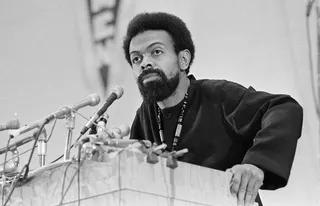From the Harlem Renaissance to Slam: Black Poetry Movements
A look at Black poetry movements for National Poetry Month.

1 / 5
Harlem Renaissance - Black writers have made major contributions to the poetry world. In celebration of National Poetry Month in April, take a look at Black poetry movements through the years. — Natelege Whaley (@natelege) Langston Hughes (pictured above), Countee Cullen, Gwendolyn Bennett and others are a few of the gifted poets who were part of the Harlem Renaissance of the 1920s and '30s. Much of their prose was centered on racial identity. Together, they and other Black authors published the short-lived literary journal Fire!! — its headquarters ironically burned down after one issue. (Photo: Hulton Archive/Getty Images)

2 / 5
Négritude - Négritude was a cultural movement created by Black franco-phone artists, politicians and intellectuals in the 1930s. Poet Aimé Césaire (pictured above) started the movement, which rejected French colonial racism and embraced African identity. He joined with poets Léopold Sédar Senghor and Léon-Gontran Damas and founded the journal L'Étudiant noir (The Black Student) in 1934. (Photo: Maxppp /Landov)

3 / 5
Black Arts Movement - The Black Arts Movement was inspired by the civil rights and Black power movements. Poets of this period created often politically driven poetry between 1960 to 1970. The late Amiri Baraka was a key figure during the time. Nikki Giovanni and Gil-Scott Heron were other writers who emerged during the Black Arts movement. (Photo: AP Photo/Julian C. Wilson, File)
Photo By Photo: AP Photo/Julian C. Wilson

4 / 5
Dark Room Collective - In 1988, a small community of Black poets founded the Dark Room Collective in Boston. Former U.S. Poet Laurete Natasha Trethewey (pictured above) was a member of the group that held reading series in the city. Others, including Tracy K. Smith, have gone on to receive distinguished awards, such as the Pulitzer Prize, for their work. The group went on a reunion tour in 2013 to celebrate their 25th anniversary. (Photo: Gail Oskin/Getty Images for American Academy of Arts and Sciences)
